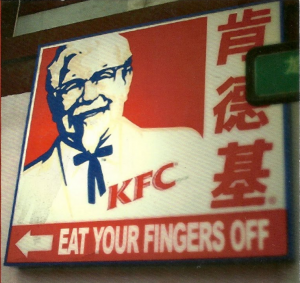In 1987, Braniff Airlines aired an advertisement of their new slogan urging travelers to “fly in leather” in Spanish, shocking local Latin American consumers and advertising executives. Without using an expert translator to take into consideration regional colloquialisms, and no doubt using a bilingual dictionary (this was before the Internet), the phrase “in leather” was literally translated to “en cuero,” which is universal Latin American slang for “naked.” So, in effect, Braniff Airlines told their customers to “fly naked.”
Also in 1987, Kentucky Fried Chicken expanded its, “Finger licking good” campaign into China. The launch of their first restaurant, in Beijing, mistranslated their slogan as “Eat your fingers off.”
In 2009, HSBC Bank’s global private banking enterprise ran into trouble when its five-year-old tagline, “Assume Nothing,” was awkwardly translated as “Do Nothing” in many countries. HSBC Bank apparently did nothing to ensure their slogan was properly translated in the global environment. “The world’s private bank,” as HSBC Bank is now known as, spent $10 million to rebrand their global messaging to gain back client trust and fee income.
All of these translation blunders demonstrate the need for companies to make language a number-one priority when going global with their business. Mistranslations have devastating impacts on businesses. An incorrect translation may ruin an initial opening in a foreign country, cause the loss of consumers, and be financially detrimental both in regard to profits and in the costs of apologizing publicly for insensitivity or offensive translations.
Contact TransForma to help you with your global expansion strategy.




